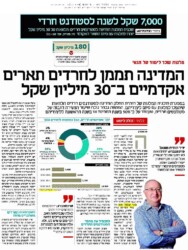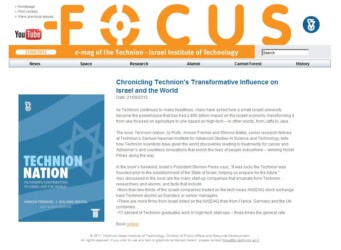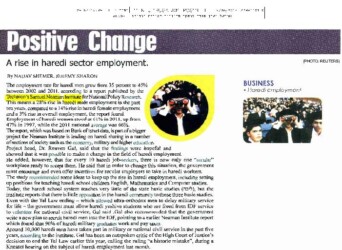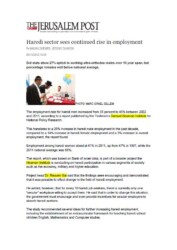Connect to schedule an interview
+972.4.829.2329
Neaman in the media
Rise in the number of employed Haredim in the last decade
In the last decade the number of haredim entering the labor market jumped by 28%
Kinneret College opens its doors to the Haredi public
The State allots 30 million to finance academic degrees for the Orthodox community degrees in 30 million
Manuel Trajtenberg
Scholarship program of the PBC: the state will grant loans to haredi students that will turn into scholarships upon completion of their studies. This layout was chosen in light of a Samuel Neaman report that found a high dropout rate of haredi students, about 50%, in preparatory or freshmen courses.
Chronicling Technion’s Transformative Influence on Israel and the World
As Technion continues to make headlines, many have asked how a small Israeli university became the powerhouse that has had a $60 billion impact on the Israeli economy, transforming it from one focused on agriculture to one based on high-tech – in other words, from Jaffa to Java.
The book Technion Nation, by Profs. Amnon Frenkel and Shlomo Maital, senior research fellows at Technion’s Samuel Neaman Institute for Advanced Studies in Science and Technology, tells how Technion scientists have given the world discoveries leading to treatments for cancer and Alzheimer’s and countless innovations that enrich the lives of people everywhere – winning Nobel Prizes along the way.
In the book’s foreword, Israel’s President Shimon Peres says, “It was lucky the Technion was founded prior to the establishment of the State of Israel, helping us prepare for the future.”
Also discussed in the book are the many start-up companies that emanate from Technion researchers and alumni, and facts that include:
•More than two-thirds of the Israeli companies traded on the tech-heavy NASDAQ stock exchange have Technion alumni as founders or senior managers.
•There are more firms from Israel listed on the NASDAQ than from France, Germany and the UK combined.
•17 percent of Technion graduates work in high-tech start-ups – three times the general rate.
Positive Change
Rise in the rate of employment of the Haredi Sector: A research report of the Samuel Neaman Institute points to a rise from 35% (in 2002) to 45% (in 2011) in the rate of employment of Haredi men in Israel.
Industry, Trade & Labor Minister Shalom Simhon: “The way to success of the Israeli industry is in creating the right combination between traditional practice and high-tech industry”
“The way to success of the Israeli industry is in creating the right combination between traditional practice and high-tech industry” said Shalom Simhon, Minister of Industry, Trade & Labor during the second Misgav conference for classic industries, held in Yuvalim, Misgav. The conference was attended by leaders in the economy and academia, including Oded Tira, Chairman of Phoenicia Israel – America, Israel Makov, Chairman of Given Imaging, Avi Hasson Chief Scientist of the ITL Office and Professor Miriam Erez director of the Center for Innovation at the Technion and Israel Prize laureate.
Haredi sector sees continued rise in employment
BoI stats show 27% uptick in working ultra-orthodox males over 10 year span, but percentage remains well below national average.
Survey: Employment rate of Ultra-Orthodox men rose by 28% within a decade
An examination of the Samuel Neaman Institute at the Technion found that the employment rate of Ultra-Orthodox men aged 25-54 increased between 2002-2011 from 35% to about 46%. Among Ultra-Orthodox women, the employment rate in recent years has crossed the 50% bar.
The Secret of Israel’s Success in 125 Pages
If you liked Start-Up Nation, you’ll be intrigued by this new book, Technion Nation: The Technion’s Contribution to Israel and the World by Amnon Frenkel and Shlomo Maital.
Israel ,The Exit Country
Nimble and flimsy startups, without a deck and railing, open up and close down – the successful ones are sold overseas. How do you build stable industrial flagships alongside them that are able to provide for thousands of families and navigate the Israeli economy to safety?










